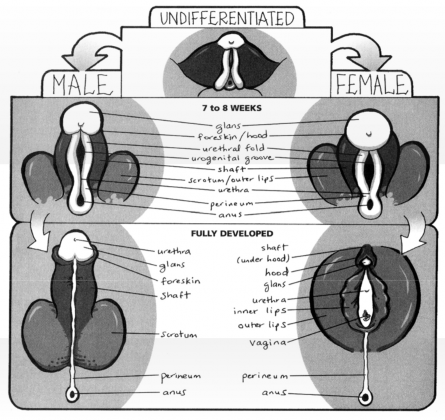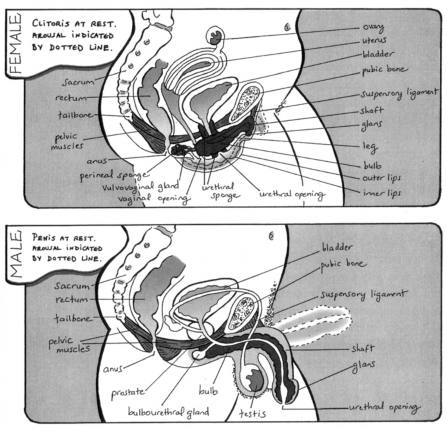The Clitoral Truth: The Secret World at Your Fingertips (3 page)
Read The Clitoral Truth: The Secret World at Your Fingertips Online
Authors: Rebecca Chalker
IN THE MID-1950s, GROWING UP in a small town in the South, my friends and I suffered from adult amnesia about sexuality and a dearth of words similar to Anne Frank’s. When I was in the seventh grade, we had a one-hour ‘sex education’ session. During this highly charged but rather unrevealing time, we watched an animated cartoon that depicted a sperm literally floating from the outline of a male body into the abdomen of the outline of a female body. As did most adolescents in the 1950s, we educated ourselves in haphazard, sometimes serendipitous ways. In the eighth grade, two of us babysat for our chorus teacher and quickly discovered a ‘marriage manual’ on her bookshelf. The next time she and her husband went to a movie, a mixed group of five or six of us showed up as soon as the taillights of their car disappeared over the hill. Over the next few months, we readthe “marriage manual” loud from cover to cover, when ever two of us babysat. We found out how to engage in foreplay, how the sperm really gets into the vagina, and how a man and a woman achieved simultaneous orgasm (in theory). But the vocabulary remained somewhat opaque. I remember being particularly flummoxed by the term “labia.” There were no pictures in the manual, and the dictionary was useless, since I had no idea what “genitals” were.
Naturally we wanted to know more, so we hatched a bold plan. After school, five or six of us took the city bus to the Florida State Library. I had been a regular library-goer since the fifth grade, and knew my way around the stacks. Having no sense that we were about to perform a radical act, but well aware that we were doing something “forbidden,” we looked up “Sex” in the card catalog and went immediately to the sexuality section.

Naturally the selection wits limited but we did find the Kinsey report, with its many accounts of real people having sex. A whole new world opened up for us. For me, the grand revelation was that this covert activity that provoked giggles, snickers, and knowing glances among adults, was indeed a ubiquitous, normal, and somehow intensely rewarding human activity. It was years, however, before I learned that “labia” meant “lips,” which were not on the face but between a woman’s legs on the face of the genitals. In retrospect, I now wonder if our teacher purposely left that book in plain view in her home to supplement the cartoon version of sexuality education we were given. For that era, it would have been a very subversive move.
In 1997 a bill providing the first-ever government funding for sexuality education from kindergarten through the twelfth grade was passed by Congress, and signed into law by President Bill Clinton. This would be something to celebrate if the bill had not been designed with input from conservative think tanks such as Focus on the Family and the National Association of Christian Education, which espouse abstinence until marriage as the only healthy sexual strategy. The bill provides $250 million over five years for programs that use medical misinformation and unproven psychological theories to promote fear and shame:
Contraception: Young people may get sick or even die if they use it.
STDs: Virtually no information is provided on how to prevent them.
Abortion: Exceedingly rare problems such as infection, hemorrhage, future miscarriages, premature births, infertility,

and post-abortion depression are presented as “very likely” outcomes.
Gender orientation: Homosexuality is depicted as “unhealthy”
Nontraditional family structures are depicted as being “deeply troubled.”
4
All of this simplistic, sex-negative information is designed to discourage teens from engaging in sex. The bill expressly denies grants to any state or community whose programs contain any information or skill-training that helps teens develop positive attitudes toward sex and healthy sexual decision making and behavior. Certainly abstaining from intercourse until one is better equipped to handle the emotional and physical consequences is a valuable sexual strategy but advocating abstinence as the only viable strategy leaves teens (more than 50 percent of whom are sexually active) vulnerable to the very real consequences of sexual involvement.
These government-funded programs, including Teen Aid and Respect Inc., may actually be worse than what passed for sexuality education in the 1950s. In order to get useful, sex- positive information young people are being forced, as they were in the past, to look outside of sexuality education for answers and solutions to their questions and sexual dilemmas. The lucky ones will find help. The unlucky ones will not, and there is a high likelihood that as they mature, they will view their sexuality through the sex-negative lens of the conservative eye. Fortunately those who do seek outside information have a plethora of options, a representative sample of which is listed in Resources.
THE ANATOMY OF SEX
One of the reasons sex is thought to be more dynamic and rewarding for men than for women is that the penis is seen as much larger and more complex, and consequently more powerful, than women’s genitals. After all, the penis is readily visible, usually snaps to attention at the drop of the trousers, and shoots off like a water pistol during orgasm. However, there is more to our genitals than meets the eye... or better yet, the hand.
The idea that the clitoris is as big and powerful as the penis may seem preposterous, especially if you look in almost any medical dictionary, anatomy text, or sexuality advice book and see a tiny glans labeled as “THE CLITORIS.” So many books concur with the depiction of the clitoris as a miniscule pea, that one would be forced to conclude that this is true, and that those who think otherwise have a full-blown case of penis envy. But quite the opposite is true.
WHICH IS THE BOY AND WHICH IS THE GIRL?
If you were to look at an illustration of a human embryo at two months, it is impossible to discern the sex of the developing organism. During the first eight weeks of gestation, all embryos appear to be female. Around the seventh week, if the embryo has two X (female) chromosomes, it will continue to develop as a female. If it has one X and one Y (male) chromosome, it will begin

to produce testosterone, which stimulates the growth of rudimentary male sexual features. So much for the Eve-out-of-Adam myth. As you can see, it is Adam-out-of-Eve. Figure 1 shows the common origins of the major parts of the male and female genital anatomy.
FEMINISTS REDISCOVER THE CLITORIS
The modern, anatomically correct definition of the clitoris was developed by the FFWHCs. None of the women in the group had any formal medical training, but they learned about basic well- woman gynecology by working in their clinics and reading widely in the field. In 1975, they decided to write a book on women’s reproductive health using the knowledge they had gained through the day-to-day operation of their clinics. In addition to issues such as abortion, contraception, and vaginal health, they decided to include a chapter on sexuality.
“Initially, we thought we would just review the popular and medical literature on sexuality, critique it, and write the chapter, but we were in for a big surprise,” says Carol Downer, the FFWHCs founder and its longtime CEO. “Little of what we found in sex advice books or in medical texts seemed to correspond to our sexual experiences or to illuminate them in any useful way.”
5
They had run headlong into the male-centered, heterosexual model of sexuality.
Based on Frank H. Netter, M.D., The CIBA Collection of Medical Illustrations: The Reproductive System, Vol. 2 (CIBA Pharmaceutical Company, 1965.)
FIGURE 1: FETAL GENITAL ANATOMY

FIGURE 1a: FEMAIL VS. MALE
In a quest to understand sexual response from a woman’s perspective, nine women from the Los Angeles and Orange County, California, FFWHCs—Carol Downer, Suzann Gage, Sherry Shiffer, Lorraine Rothman, Francie Hornstein, Lynn Heidelberg, Kathleen Hodge, Lynn Walker, and Chris Cleary—held regular consciousness raising sessions and shared their intimate sexual experiences in considerable depth. They dissected their sexual responses in minute detail, taking off their pants, sitting in a circle, and comparing parts of their visible genital anatomy to textbook illustrations. To find more detailed information, they examined classic anatomical illustrations, tracking down obscure references in eighteenth- and nineteenth-century European anatomy texts. The only modern book that they found to be illuminating was psychiatrist Mary Jane Sherfey’s
The Nature and Evolution of Female Sexuality
.
6
Taking off from Masters and Johnson’s definition of the penis, Sherfey argued that the clitoris is no more just its tip (the glans) than the penis; is just its glans. She compared the clitoris to the penile anatomy point by point, demonstrating how they were equivalent to each another and finding the clitoris to be an extensive and powerful organ system.
Several women in the group made movies and took photographs of one another masturbating to closely observe the dynamic changes that occur in the visible structures of the clitoris during sexual response. In preparation for doing the anatomical illustrators, artist
Suzann Gage, a member of the group, took an anatomy course at UCLA. Her illustrations vividly brought the group’s concept of tilt clitoris to lift.
Using historical and modern anatomical descriptions, the group enlarged and refined Sherfey’s description of the clitoris., creating a new definition that encompassed all of the structures undergoing changes during orgasm, whether contributing to orgasm in a significant way or marking the boundaries. After doing their intensive study of women’s genital anatomy, the FFWHCs identified eighteen structures; some of these are readily visible, while others cannot be seen but are easily felt, especially during sexual response, Still others cannot be felt, but when they are engorged with blood during sexual response, they cause the clitoris to greatly increase in size just as the penis don. The group’s analyses and redefinition of the clitoris were originally published in a book I edited, entitled
A New View of a Woman’s Body: An Illustrated Guide
.
7